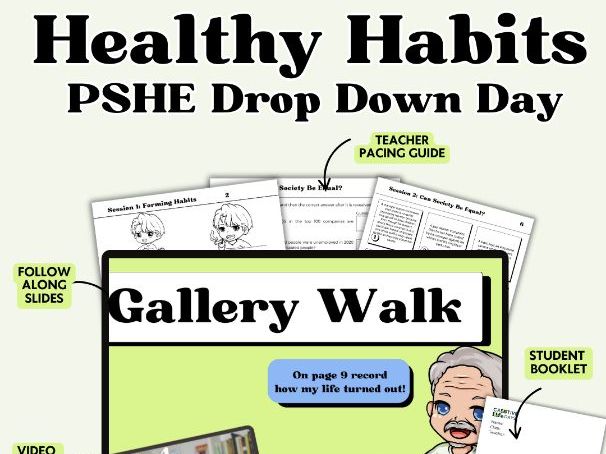













Healthy lifestyles – PSHE Drop Down Day For Secondary Students Aged 11–14
This curriculum day blends science, self-reflection, and creativity to enhance your existing PSHE provision and help students take ownership of their everyday routines and behaviours. Encourage your students to take control of their routines, boost self-awareness, and develop habits that support long-term wellbeing and success.
Alignment with New RSHE 2025 Requirements
- Mental wellbeing & self-regulation: Explains how habits form and gives coping/management strategies—core Health Education content
- Health & prevention: Distinguishes healthy vs unhealthy routines (sleep, nutrition, physical activity, screen balance) and their impact on wellbeing
- Peer influence & online pressures: Examines how friends and digital environments shape behaviour, aligning with relationships/online-safety expectations in the 2025 update
- Respectful relationships & communication: Team challenges practise collaboration, respectful dialogue and conflict-resolution—part of RSHE relationships content
Healthy Habits PSHE Drop Down Day – What’s it all about?
In this interactive and thought-provoking day, students will dive into the science of habit formation through the story of Lazy Lyle — a character whose brain mirrors our own tendency to form automatic behaviours, for better or worse.
Over five engaging sessions, students will:
Explore how habits are formed
Take part in interactive games and group discussions
Create a visual display that reflects their understanding
Reflect on their own habits and set personal goals
This day combines fun, hands-on learning with meaningful self-reflection — all designed to help students build healthier patterns in their daily lives.
No lengthy prep required! Teachers are fully supported with:
- Teacher Instruction Guidance Booklet
- Student Guidance Booklet
- PPT Presentation Slides (Sessions 1–5)
- LᴉfeFluent Instructional Videos (Sessions 1–5)
- Student Evaluation Form
- Student Certificates (optional)
- Printable Handouts and Activity Resources
**Learning Outcomes **
- Practice Empathy Responses: Students will learn to identify and practice empathetic responses by recognising emotions, validating feelings, and offering supportive statements to strengthen interpersonal connection
- Mirror Body Language: Students will explore the concept of mirroring body language as a non-verbal way to show empathy and understanding, practicing techniques that create a sense of connection and trust.
- Celebrate Others’ Joys: Students will develop the ability to express genuine happiness for others by practicing affirming language, enthusiastic reactions, and encouraging behaviours that relationships.
- Respond in Healthy Ways: Students will examine healthy empathetic responses, focusing on balancing compassion with appropriate boundaries, ensuring their support is respectful and constructive
Something went wrong, please try again later.
This resource hasn't been reviewed yet
To ensure quality for our reviews, only customers who have purchased this resource can review it
to let us know if it violates our terms and conditions.
Our customer service team will review your report and will be in touch.